Comcast has quietly updated its online customer support website to reflect the forthcoming introduction of data caps to the last remaining major regions of the country where it has avoided imposing them for years.
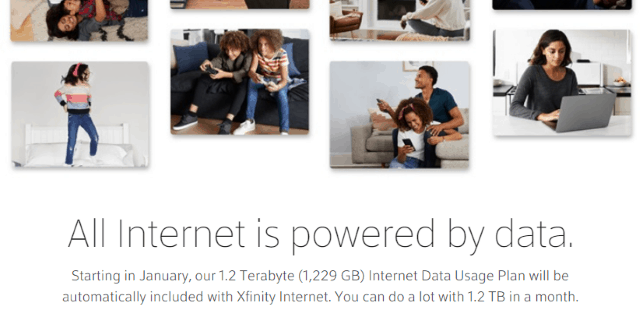
The nation’s largest cable company will debut its 1.2 TB data cap usage plan on January 1, 2021 in Connecticut, Delaware, the District of Columbia, Massachusetts, Maryland, Maine, New Hampshire, New Jersey, New York, North Carolina, Ohio, Pennsylvania, Virginia, Vermont, and West Virginia.
“Customers in select markets can take the months of January and February to understand how the new 1.2 TB Internet Data Plan affects them without additional charges,” Comcast wrote on its new customer FAQ page. “We’ll credit your bill for any additional data usage charges over 1.2 TB during those months if you’re not on an unlimited data plan. It does not apply to Xfinity Internet customers on our Gigabit Pro tier of service, Business Internet customers, customers with Prepaid Internet, or customers on Bulk Internet agreements.”
But effective March 1st, residential customers will begin facing overlimit fees for exceeding their data allowance at a rate of $10 for each 50 GB of excess usage, up to a maximum of $100 a month. Customers will not be credited for unused data, cannot rollover unused data, or be charged less than $10 in overlimit fees, regardless if one used 1 MB or 49 GB over the 1.2 TB allowance.
Customers approaching their usage limit will receive email, text messages, and Xfinity X1 on-screen notifications upon reaching 75% (email only), 90%, and 100% of 1.2 TB of data usage. Overlimit fees that subsequently start accumulating will be noted in email and X1 on-screen notifications for each additional 50 GB of usage over 1.2 TB, up to the maximum overage charge of $100.
Customers can return to the unlimited data plan they had before January 1st by paying an additional $30 a month for an unlimited add-on plan.
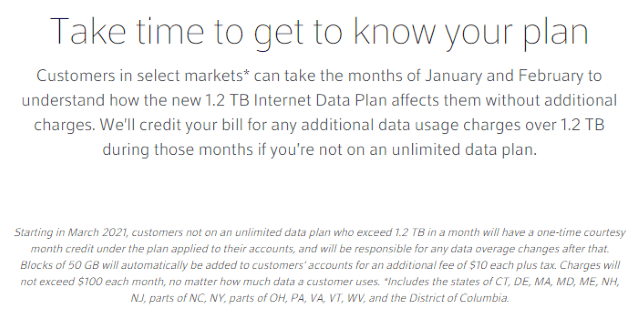
Comcast imposed data caps on residential customers in other parts of the country for years, but had avoided doing so until now in the northeast and mid-Atlantic states where Verizon FiOS is a frequent competitor. Verizon does not impose formal data caps on its residential customers. The introduction of data caps by Comcast is likely to result in a shift of some customers towards Verizon, if FiOS is available.
Comcast is certain to be criticized for expanding data caps in the middle of the COVID-19 pandemic, especially as the number of cases explodes in the United States, pushing more people than ever to work from home. The resulting increased usage will expose a growing number of Comcast customers to overlimit fees, starting at $10 additional a month. Usage caps are also not expected to slow the company’s ongoing rate increases. One of Comcast’s most successful businesses is selling residential broadband, often with no significant competition, and with customers unlikely to drop service there is plenty of room to raise prices further.

Protesters in front of the Time Warner Cable in Rochester, N.Y., protesting the introduction of data caps in 2009.
Fighting Back
The most effective ways to combat data caps are:
- Switch providers and tell Comcast you are leaving because of the imposition of data caps. Reject any arguments that suggest usage allowances will impact only a handful of customers. Ongoing studies show a growing number of consumers are exceeding these arbitrary “allowances”, forcing them to pay unjustified overlimit fees or subscribe to a costly unlimited plan for as much as $30 more a month. Usage caps are unnecessary in 2020. Comcast itself claims it has plenty of capacity across its network, including areas where no caps are currently imposed. But they now think it is appropriate to introduce caps in the middle of the COVID-19 pandemic.
- Organize a noisy but legal protest in front of a local cable store or Comcast’s headquarters and contact newspapers, radio and TV stations in advance to invite them to cover the event. Be sure to carry signs and designate one or more members to be interviewed by the media about the unacceptability of data caps. We can supply talking points on request.
- Contact your local, state, and federal representatives and complain about Comcast imposing data caps. This is especially effective when tied-in with local protests, which may attract elected officials to the cause. There is precedent for companies backing down if consumers coordinate with elected officials and loudly protest. Tell officials your community’s digital future should not be dictated by Comcast and its unwanted data caps. More competition is needed, and until it substantially exists, ask them to ban “data plans” for home broadband service. Ask them to support municipal solutions, such as public/municipal internet service.
- Remind everyone that internet availability is not the only issue. Affordability is also a growing problem that puts much needed internet service out of reach of low-income citizens. Imposing data caps is just another way of raising prices and deterring innovation.


 Subscribe
Subscribe
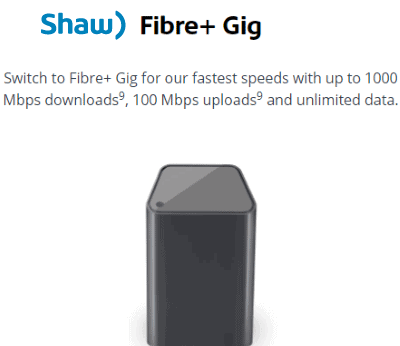

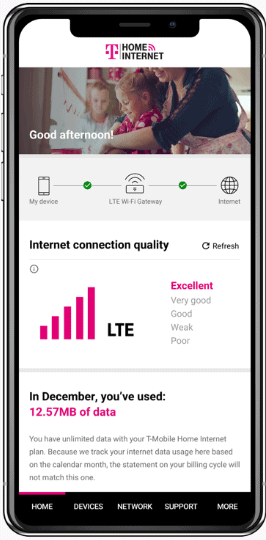 T-Mobile is widening its wireless home broadband pilot program to cover more than 20 million additional underserved and unserved households in 130 communities in parts of nine states.
T-Mobile is widening its wireless home broadband pilot program to cover more than 20 million additional underserved and unserved households in 130 communities in parts of nine states.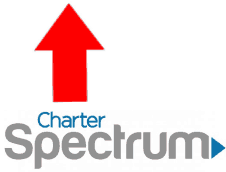 Charter Spectrum is raising the price of its internet service by $5 a month starting in December, making most internet-only customers pay $74.99 a month for service starting at 100 Mbps.
Charter Spectrum is raising the price of its internet service by $5 a month starting in December, making most internet-only customers pay $74.99 a month for service starting at 100 Mbps.